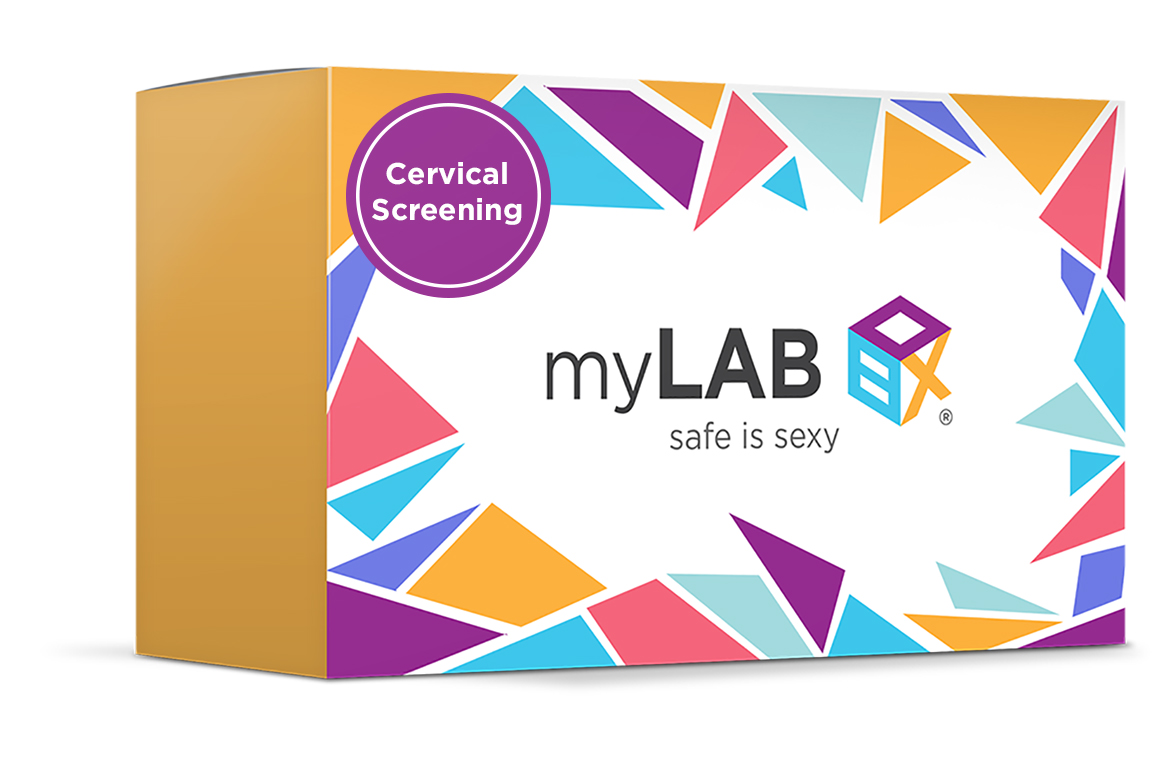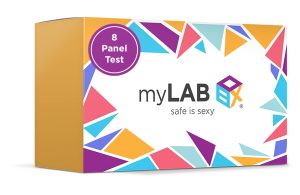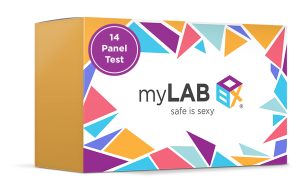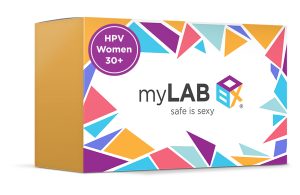Cervical Cancer Screening using HPV

- HPV is a virus that causes cervical cancer. This test is for women 30 years of age and older.
- Mail-in kits for home use
- Test in just 5 minutes
- Lab results in 2-5 days
- 100% pain free
- Free physician consultation
- Enjoy free shipping
Temporarily unavailable in NY state.
Fast, easy, affordable at-home testing
Private
Test from the privacy of home
Easy
Lab Certified 5-minute test
Fast
Get results in 2–5 days
Free
Physician Consultations
[vc_row][vc_column][vc_column_text]Dread going to the gyno? You’re not alone. Those paper gowns can be painfully revealing. And sliding into those stirrups can be awkward. But getting regular screenings for cervical cancer is one of the best ways to protect your health. Now you can keep up with those all-important screenings from the comfort of your home. By screening for Human Papillomavirus (HPV), the myLAB Box cervical cancer home test kit offers a quick and convenient way to see if you might be at risk of developing this highly treatable cancer.
Follow the kit instructions to collect your vaginal swab in as little as 5 minutes. Mail your sample to the lab in the pre-addressed, postage-paid envelope. Log in to your account in 2-5 days to get your secure electronic results. It’s that easy!
Included: 1 (ONE) combo mail-in kit for HPV cervical cancer screening
Tests for: 14 types of genital high-risk HPV, including two specific types, HPV-16 and HPV-18, which cause most cervical cancers, plus a group of 12 other high-risk HPV types that may also lead to cancer.[/vc_column_text][/vc_column][/vc_row][vc_row][vc_column width=”1/2″][vc_column_text]
HPV AND CERVICAL CANCER FAQS
What is cervical cancer?
Cervical cancer is cancer that starts in the cervix. The cervix is the narrow opening from the vagina into the uterus. It is a slow-growing cancer that can take years to develop. Regular screenings can spot HPV infections that may cause abnormal cells to develop in the future. When found early, these cells can be treated before they turn into cancer.
What causes cervical cancer?
Cervical cancer is caused by genital HPV, an STI that almost half of all American adults have. There are many types of genital HPV, but only about 14 are considered high-risk types of HPV that have been linked to cervical cancer. Women 30 and older who test positive for these high-risk viruses are more likely to have HPV infections that do not go away. Over time, these persistent HPV infections may cause changes in the cells of the cervix. Without regular screening and treatment, these changes may develop into cervical cancer.[/vc_column_text][/vc_column][vc_column width=”1/2″][vc_column_text css=”.vc_custom_1559556690514{border-top-width: 1px !important;border-right-width: 1px !important;border-bottom-width: 1px !important;border-left-width: 1px !important;padding-top: 20px !important;padding-right: 20px !important;padding-bottom: 20px !important;padding-left: 20px !important;background-color: #d9d9d9 !important;border-left-color: #b9b9b9 !important;border-left-style: solid !important;border-right-color: #b9b9b9 !important;border-right-style: solid !important;border-top-color: #b9b9b9 !important;border-top-style: solid !important;border-bottom-color: #b9b9b9 !important;border-bottom-style: solid !important;border-radius: 3px !important;}”]WHY SCREEN FOR CERVICAL CANCER
Screening tests can prevent cervical cancer or find it early enough to treat and cure. Cervical cancer is caused by HPV, the most common sexually-transmitted infection (STI) in the United States. The myLAB Box cervical cancer screening uses advanced DNA technology to look for the high-risk types of HPV that can cause cervical cancer. The test can tell if you are at risk of developing cervical cancer before any cancer cells appear.[/vc_column_text][/vc_column][/vc_row][vc_row][vc_column][vc_column_text]Who gets cervical cancer?
More than 12,000 women in the US are diagnosed with cervical cancer every year. About 1 in 20 women 30 and over has high-risk HPV. This means they have an increased risk of developing cervical cancer. Luckily, this type of cancer can be prevented with regular screening tests and the HPV vaccine.
What are the symptoms of HPV and cervical cancer?
Most HPV infections do not cause symptoms. In fact, the infection usually clears up on its own in individuals under 30.
Cervical cancer also does not usually cause symptoms. In rare cases, it may cause vaginal bleeding or discharge and pelvic pain. These symptoms, however, could be signs of other conditions. That’s why it is so important to keep up with regular screenings.
How do I get screened for cervical cancer?
In the past, if you wanted to screen for cervical cancer, you had to go to the doctor for a Pap test (also known as a Pap smear) or a Pap test plus HPV testing.
- The Pap test looks for changes in a sample of cells from the cervix, the narrow opening from the vagina into the uterus.
- HPV tests look at the DNA or RNA in cervical cells to detect the high-risk HPV types that may cause cervical cancer.
HPV testing is the most accurate way to identify women at risk of developing cervical cancer.
How accurate is the myLAB Box HPV cervical cancer screening test?
The myLAB Box HPV home test is FDA-approved for primary cervical cancer screening in women 30 and over. The myLAB Box screening test uses a highly accurate process called genotyping to specifically identify the 2 high-risk types known to cause most cervical cancers, HPV-16 and HPV-18. The test also tells you if you are positive or negative for a group of 12 other high-risk HPV types: 31, 33, 35, 39, 45, 51, 52, 56, 58, 59, 66 and 68. This gives you more information about your cervical cancer risk and empowers you to take charge of your health by screening for cervical cancer from the comfort of home.
What happens if I test positive on the myLAB Box cervical cancer screening?
If you test positive, you can get a free phone consultation with a myLAB Box physician affiliate. Our medical expert will go over your results and discuss next steps.
A positive HPV result does not mean you have cervical cancer, but it is important to follow up with your health care provider. If you have a positive HPV test result, you will likely need to have a Pap test. If the Pap test shows abnormal cells, your health care provider may recommend further testing. You may also need to repeat the HPV test.
Does the HPV test screen for genital warts?
No, the HPV test screens for the high-risk HPV types that cause cervical cancer. Genital warts are caused by low-risk HPV types. Genital warts are bumps that appear on the genitals or in and around the anus. They can be itchy and uncomfortable, but rarely lead to cancer. If you think you have genital warts, see your healthcare provider for diagnosis and treatment.
Who should get the HPV screening test – and who shouldn’t?
It depends on your age and gender.[/vc_column_text][/vc_column][/vc_row][vc_row][vc_column][vc_raw_html]JTNDdGFibGUlMjBjZWxscGFkZGluZyUzRCUyMjUlMjIlMjBib3JkZXIlM0QlMjIxJTIyJTIwc3R5bGUlM0QlMjJ3aWR0aCUzQTEwMCUyNSUyMiUzRSUwQSUyMCUyMCUzQ3RyJTNFJTBBJTIwJTIwJTIwJTIwJTNDdGQlMjBhbGlnbiUzRCUyMmNlbnRlciUyMiUzRSUzQ2IlM0VXb21lbiUyMDMwJTIwYW5kJTIwb2xkZXIlM0MlMkZiJTNFJTNDJTJGdGQlM0UlMEElMjAlMjAlMjAlMjAlM0N0ZCUyMGFsaWduJTNEJTIyY2VudGVyJTIyJTNFJTNDYiUzRVdvbWVuJTIwdW5kZXIlMjAzMCUzQyUyRmIlM0UlM0MlMkZ0ZCUzRSUyMCUwQSUyMCUyMCUyMCUyMCUzQ3RkJTIwYWxpZ24lM0QlMjJjZW50ZXIlMjIlM0UlM0NiJTNFTWVuJTIwb2YlMjBhbnklMjBhZ2UlM0MlMkZiJTNFJTNDJTJGdGQlM0UlMEElMjAlMjAlM0MlMkZ0ciUzRSUwQSUyMCUyMCUzQ3RyJTNFJTBBJTIwJTIwJTIwJTIwJTNDdGQlMjB3aWR0aCUzRCUyMjMzJTI1JTIyJTIwYWxpZ24lM0QlMjJjZW50ZXIlMjIlM0UlM0NiJTNFWUVTJTNDJTJGYiUzRSUzQ2JyJTIwJTJGJTNFVGhlJTIwSFBWJTIwc2NyZWVuaW5nJTIwdGVzdCUyMGZvciUyMGNlcnZpY2FsJTIwY2FuY2VyJTIwaXMlMjByZWNvbW1lbmRlZCUyMGZvciUyMHdvbWVuJTIwMzAlMkIlMjBiZWNhdXNlJTIweW91JTIwYXJlJTIwbW9yZSUyMGxpa2VseSUyMHRvJTIwaGF2ZSUyMEhQViUyMGluZmVjdGlvbnMlMjB0aGF0JTIwZG8lMjBub3QlMjBnbyUyMGF3YXklMjBxdWlja2x5LiUyMFRoaXMlMjBjYW4lMjByYWlzZSUyMHlvdXIlMjByaXNrJTIwZm9yJTIwY2VydmljYWwlMjBjYW5jZXIuJTNDJTJGdGQlM0UlMEElMjAlMjAlMjAlMjAlM0N0ZCUyMHdpZHRoJTNEJTIyMzMlMjUlMjIlMjBhbGlnbiUzRCUyMmNlbnRlciUyMiUzRSUzQ2IlM0VOTyUzQyUyRmIlM0UlM0NiciUyMCUyRiUzRVdoaWxlJTIwdGhlJTIwSFBWJTIwdmlydXMlMjBpcyUyMGNvbW1vbiUyMGluJTIwd29tZW4lMjB1bmRlciUyMDMwJTJDJTIwbW9yZSUyMHRoYW4lMjA5MCUyNSUyMG9mJTIwbmV3JTIwaW5mZWN0aW9ucyUyMHdpbGwlMjBjbGVhciUyMHVwJTIwb24lMjB0aGVpciUyMG93biUyMHdpdGhpbiUyMDIlMjB5ZWFycy4lMjBUaGVyZWZvcmUlMkMlMjBIUFYlMjB0ZXN0aW5nJTIwaXMlMjBub3QlMjByZWNvbW1lbmRlZCUyMHVudGlsJTIweW91JTIwYXJlJTIwMzAlMjBvciUyMG9sZGVyLiUzQyUyRnRkJTNFJTIwJTBBJTIwJTIwJTIwJTIwJTNDdGQlMjB3aWR0aCUzRCUyMjMzJTI1JTIyJTIwYWxpZ24lM0QlMjJjZW50ZXIlMjIlM0UlM0NiJTNFTk8lM0MlMkZiJTNFJTNDYnIlMjAlMkYlM0VUaGUlMjBDREMlMjBkb2VzJTIwbm90JTIwcmVjb21tZW5kJTIwSFBWJTIwdGVzdGluZyUyMGluJTIwbWVuJTIwYmVjYXVzZSUyMHRoZXJlJTIwYXJlJTIwbm8lMjBGREEtY2xlYXJlZCUyMEhQViUyMHRlc3RzJTIwZm9yJTIwbWVuLiUzQyUyRnRkJTNFJTBBJTIwJTIwJTNDJTJGdHIlM0UlMEElM0MlMkZ0YWJsZSUzRQ==[/vc_raw_html][/vc_column][/vc_row][vc_row][vc_column][vc_column_text]Should I get the HPV vaccine?
The HPV vaccine is highly effective in protecting against cancers caused by HPV infections. It’s best to get the HPV vaccine before becoming sexually active but those who are sexually active will also benefit from getting vaccinated. The HPV vaccine is recommended for girls and young women is up to 26 years old and for boys and young men is up to 21 years old.
Do I need to screen for cervical cancer if I’ve had the HPV vaccine?
Yes! It is important to keep getting regular screenings for cervical cancer even if you have had the HPV vaccine because the HPV vaccine does not protect against all high-risk HPV types that cause cervical cancer.
How can I protect myself from genital HPV infection and cervical cancer?
Here are a few steps that can help lower your chances of getting genital HPV and cervical cancer:
- Keep up with regular screening tests for cervical cancer.
- Get the HPV vaccine – and encourage your partner to get it, too.
- Use latex condoms the right way every time you have vaginal or anal sex.
myLAB Box offers at-home collection of samples that are mailed to our CLIA-certified and CAP-accredited laboratory. The testing performed on your samples complies with all state and federal regulations regarding laboratory testing.[/vc_column_text][/vc_column][/vc_row]
80%
1 in 3 people have an STD yet 80% have no symptoms

Fully Lab-certified
myLAB Box works only with the best laboratories and health experts to ensure your tests results meet nationwide standards and are as accurate as tests done in a clinic or a doctor’s office.
The laboratories we work with are certified CAP and CLIA high complexity testing organizations at the forefront of diagnostic testing. HIPAA web security protocols protect your data.
Fast, Easy & Private

Step 1
Order online on your mobile, tablet or PC

Step 2
Collect & mail in your sample in 5 minutes

Step 3
Get lab-certified results online in 1-5 days
You may also like…

Uber Box
8 Panel Home STD Test
In Stock - Free Shipping
Read more

Total Box
14 Panel STD Test
In Stock - Free Shipping
$369 – $399
Select options
HPV Women 30+
HPV is the #1 most common STD. This test is only available for women 30 years of age or older.
In Stock - Free Shipping
$79
Select optionsOnly logged in customers who have purchased this product may leave a review.
Disclaimer
myLAB Box offers individuals with laboratory services for wellness monitoring. All tests are validated by myLAB Box clinical laboratory affiliates. Results are comparable to samples collected in a physician’s office or clinical laboratory. Tests used in myLAB Box kits have been developed and performance characteristics determined by myLAB Box clinical laboratory affiliates. Tests have not been approved by the US Federal and Drug Administration (FDA), although individual components of some tests performed in the laboratory are FDA-cleared. The FDA has determined that such clearance or approval is not necessary for laboratory-developed tests such as those offered by my LAB Box. These tests are used for clinical purposes only. They should not be regarded as investigational or for research. myLAB Box clinical laboratory affiliates are regulated under the Clinical Laboratory Improvement Act (CLIA) of 1988 as qualified to perform high complexity clinical testing and follow the guidelines of the College of American Pathologists (CAP). The tests, and services are not intended to diagnose, treat, or cure disease. All information given as to the use of the tests is provided for educational purposes only and is not intended to be a substitute for a physician’s consultation.
Reviews
There are no reviews yet.